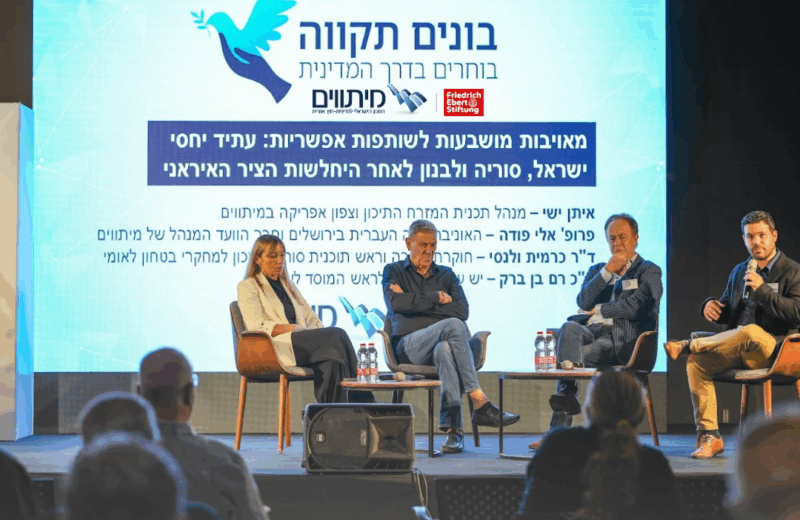 / All Events
/ All Events
The closing panel of Mitvim’s 8th Annual Foreign Policy Conference, held in November 2025 at the Rabin Center in Tel Aviv in partnership with the Friedrich Ebert Stiftung, focused on Israel’s northern arena. Under the title “From Bitter Enemies to Potential Partners,” the discussion – led by Eitan Ishai, Head of Mitvim’s Middle East & North Africa Program – examined the tectonic shifts unfolding today in Syria and Lebanon, and how Israel can, and should, respond.
Panel Participants
MK Ram Ben Barak, former Deputy Director of the Mossad
Prof. Elie Podeh, Hebrew University of Jerusalem; Member of Mitvim’s Executive Board
Dr. Carmit Valensi, Head of the Syria Program, Institute for National Security Studies (INSS)
“Without Military Power, There Would Be No Conversation About Disarming Hezbollah”
Ishai opened by describing the regional landscape: the past year has brought rare and profound strategic shifts—the weakening of Hezbollah, historic regime change in Damascus, and a new government in Lebanon speaking openly, for the first time, about dismantling armed militias. Alongside significant security risks, Ishai argued that Israel now faces a near-unprecedented opportunity to reshape its northern relations.
Ben Barak emphasized that Israel’s military achievements over the last year created the first real space for discussing new patterns of engagement with Lebanon and Syria.
“In the Middle East,” he said, “there is no diplomatic process that does not rest on deterrent power.”
Yet he stressed that force alone is insufficient. Both Syria and Lebanon are undergoing historic change, but their new governments are fragile, and both arenas remain saturated with armed factions and nodes of instability. Israel must retain military superiority while developing diplomatic initiatives that leverage emerging opportunities.
In Lebanon, he argued, no real arrangement is possible as long as Hezbollah remains armed. In Syria, by contrast, a genuine opportunity exists – one that requires a combination of security resolve and willingness to establish mechanisms for coordination and regulation.
“The Magnitude of the Syrian Shift Has Not Yet Been Internalized in Israel”
Prof. Podeh noted that the transformation underway in Syria is one of the most profound the country has experienced since the 1970s. Syria, he said, is returning to the Sunni Arab sphere, gradually distancing itself from Iranian influence and rebuilding ties with central regional actors.
In this context, he argued, Israel holds meaningful potential to act – but historical suspicion, shaped by trauma and a one-dimensional security mindset, risks leading to a missed opportunity.
He recalled how Israel squandered Anwar Sadat’s 1971 peace initiative due to entrenched assumptions and warned against repeating that mistake:
“Real change is not theoretical. It must be examined – not feared.”
Podeh called for a realistic step: a limited security agreement with Syria that revives the 1974 disengagement mechanisms and establishes a basis for mutual confidence.
In Lebanon, he said, there are signs of a shift within government rhetoric – but Hezbollah remains the central obstacle. Creative thinking is therefore required: civil, energy, and humanitarian initiatives that can lay the groundwork for future normalization.
“There Is a Window of Opportunity – But Also a Real Risk of Missing It”
Dr. Valensi described deep uncertainty surrounding Syria’s new president, Ahmad al-Shar’a: Is he a pragmatic reformer seeking stability, a tactical manipulator, or is it simply too early to know?
These competing narratives, she said, create confusion in Israel and sometimes drive overly aggressive policy that fuels public hostility in Syria and obscures openings for genuine dialogue.
She noted that despite Israel’s military gains, its recent presence in Syria has ignited a heated public discourse accusing Israel of imperial ambitions. Excessive use of force, she warned, could push al-Shar’a into Turkey’s arms – a scenario with significant strategic implications.
Valensi recommended maintaining the direct dialogue established in recent months, increasing strategic clarity in Israel’s messaging, and constructing a gradual, narrow security arrangement – without unrealistic expectations of near-term normalization.
A Regional Opportunity – With a Narrow Window
Collectively, the speakers painted a complex picture: the northern arena is filled with uncertainty and risk – yet also offers Israel a rare opportunity unseen for years.
The weakening of Hezbollah, historic change in Syria, deeper U.S. involvement, and the erosion of parts of the Iranian axis together create a volatile mix of threats – but also a unique chance to shape a new regional reality.
Israel must now choose: to continue relying solely on military force, or to combine it with a diplomatic vision that translates battlefield achievements into long-term arrangements and stable borders.
As Eitan Ishai concluded:
“We are at a turning point. The opportunity exists – the question is how we choose to act.”
Photo & video: Constantin Grossman


